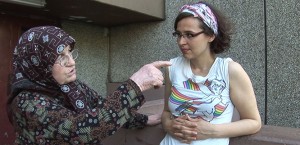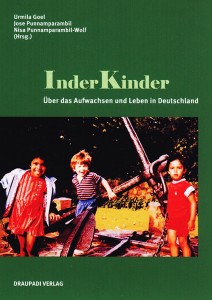
Canan Turan with her grandmother
© Adriana Uribe
In our series of events “New German Stories” we present different perspectives on the immigration country Germany. That immigrants from Turkey, Vietnam, Poland, India and Cameroon and their descendants have stories to tell is nothing new—the novel twist is, that they present them here as German stories. On Tuesday, 8 July, director Canan Turan will be a guest of the Academy of the Jewish Museum. In her film KIYMET, she tells the story of her grandmother, who migrated to Berlin from Turkey in the early 70s. We asked Canan three questions about her project:
How did the idea to make a film about your grandmother Kıymet come about? → continue reading
A Visit to the Academy’s Reading Room
Why do we keep books like Muslime im säkularen Rechtsstaat (Muslims in Secular Rule of Law), Diaspora Identities, or z.B. 650 Jahre Rixdorf (E.g. 650 Years of Rixdorf) at the Jewish Museum? Answering this question is the task of the Academy Programs on Migration and Diversity. How to find these books, however, falls to the library.

Reading room of the Jewish Museum Berlin’s library
© Jewish Museum Berlin, photo: Mirjam Bitter
Imagine that you want to learn about social structures, clubs, and immigrant biographies in Berlin, particularly in Kreuzberg, to which you yourself moved from Hesse two years ago. After visiting the museum one fine Sunday afternoon, you take a look at the new Academy, where, you heard, a friend of yours recently attended an event about the ‘new Germans.’ The Academy is closed on the weekend, but a museum host informs you that it has a library. You return on Monday and ask in the reading room about Turks in Kreuzberg. The librarian would love just to tell you, “second shelf on the left, all the way to the back – what you’re looking for is right there.” Unfortunately, it’s not quite that simple. → continue reading
Dealing Creatively with Ethnic Classifications

Book cover
© Draupadi Verlag
Tomorrow at the Academy of the Jewish Museum Berlin, Urmila Goel and Nisa Punnamparambil-Wolf will introduce the book they edited, InderKinder – Über das Aufwachsen und Leben in Deutschland (Indian-Children: on Growing Up and Living in Germany, published by Drapaudi Verlag). It’s the third in a series of events on “New German Stories” where, with the aid of individual biographies, we examine Germany’s historical and current status as an immigration society. On this occasion we’ll focus on the children of immigrants from India, who gained public awareness for the first time during the “Green Card” campaign of 2000.
Prior to the reading and discussion tomorrow, we asked the two editors, Nisa Punnamparambil-Wolf and Urmila Goel, three questions:
What made you choose this title?
We’re referring with this title to the marginalizing “Kinder statt Inder” (children instead of Indians) campaign of the year 2000. The wordplay of InderKinder (Indian-children) is meant ironically: it was important to us to find a creative way to deal with these attributions. With the book, we want to show the varied ways that people who grew up and live in Germany handle the classification of being a child of Indian immigrants.
The book consists of two parts, autobiographical stories and essays. How would you explain your concept?
→ continue reading


